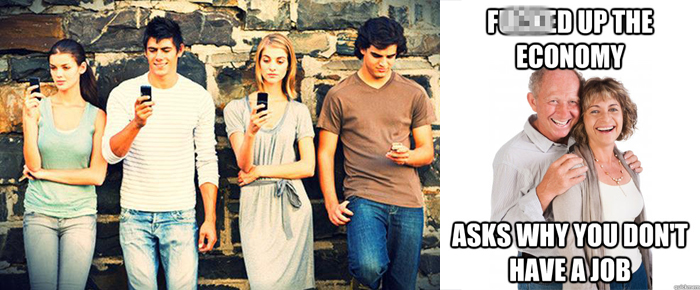
By Haddon Libby
If you were born between 1982 and 2004, you part of the Millennial Generation that is now the largest generation in the United States with 79 million people – three million more than Baby Boomers.
As there was not a lot written about this most recent generation, the Boston Consulting Group studied Millennials. For the sake of their research, they considered all Americans as either Millennials or Non-Millennials (sorry Gen X’ers and the Silent Generation).
Worth noting, the phrase Millennial was coined by writers William Strauss and Neil Howe in their books devoted to “the Next Great Generation.” Others have used the term Generation Me as they consider Millennials to be narcissistic. This negative description of Millennials shows the great divide between Baby Boomers and this younger group of Americans.
A simple way to exemplify this markedly different view of Millennials by Baby Boomers and vice versa is shown in how Baby Boomers call Millennials selfish yet the Millennials view the massive debts and pollution left by Baby Boomers as selfish and short-sighted. The two generations just do not understand each other.
While the older generation waited for opportunities in life, Millennials want things fast and they want them now. In general, Millennials distrust corporations and people with degrees and prefer to trust friends and people whom they view as honest and sincere. In general, Millennials prefer group activities and believe that they can make a difference if they do things as a group. Using restaurants as a simple example, they often dine as large groups. As such, fast, upscale fast food chains like Chipotle are preferred over sit-down restaurants with personal service.
It should be no surprise that Millennials use online social networking to stay in touch with more of their friends. As an example, 46% of Millennials have more than 200 Facebook friends while only 19% of non-Millennials do. Only 26% watch more than 20 hours of television a week versus 49% of Non-Millennials while 42% of Millennial viewing is done on Netflix, Hulu or other non-cable/network sources.
Instead of making an occasional monetary donation to a charity, Millennials are more likely to get involved. They are also more likely to incorporate their causes into their daily life. As an example, they may buy only earth friendly products while eating only locally sourced and sustainable foods. Within their generation, there is a subset that engages in slacktivism – the act of engaging in charitable activities through shows of support where very little is done personally.
This leads to the six basic Millennial personality types. The Hip-ennial feels that they can make the world a better place. They are more often female and consume social media the most. The Millennial Mom is family-oriented, works out at the gym and often feels isolated due to her schedule. She is among the most active social media users. Hip-ennials and Moms represent half of all Millennials.
The Anti-Millenial is politically conservative, focus on their life and unlikely to get involved in causes while the Gadget Guru is typically male, self-focused and successful while using the latest electronic gadgetry. Clean and Green Millennials are younger and in search of a purpose-filled life. They think about their world and environment and do what they can to make a difference. Lastly, the Old-School Millennial is conservative, male and does things through in person meetings with very little done online.
Hopefully, Strauss and Howe were correct in that the Millennials will be the Next Great Generation. They will have to be to solve the many challenges facing us domestically and around the world.










































